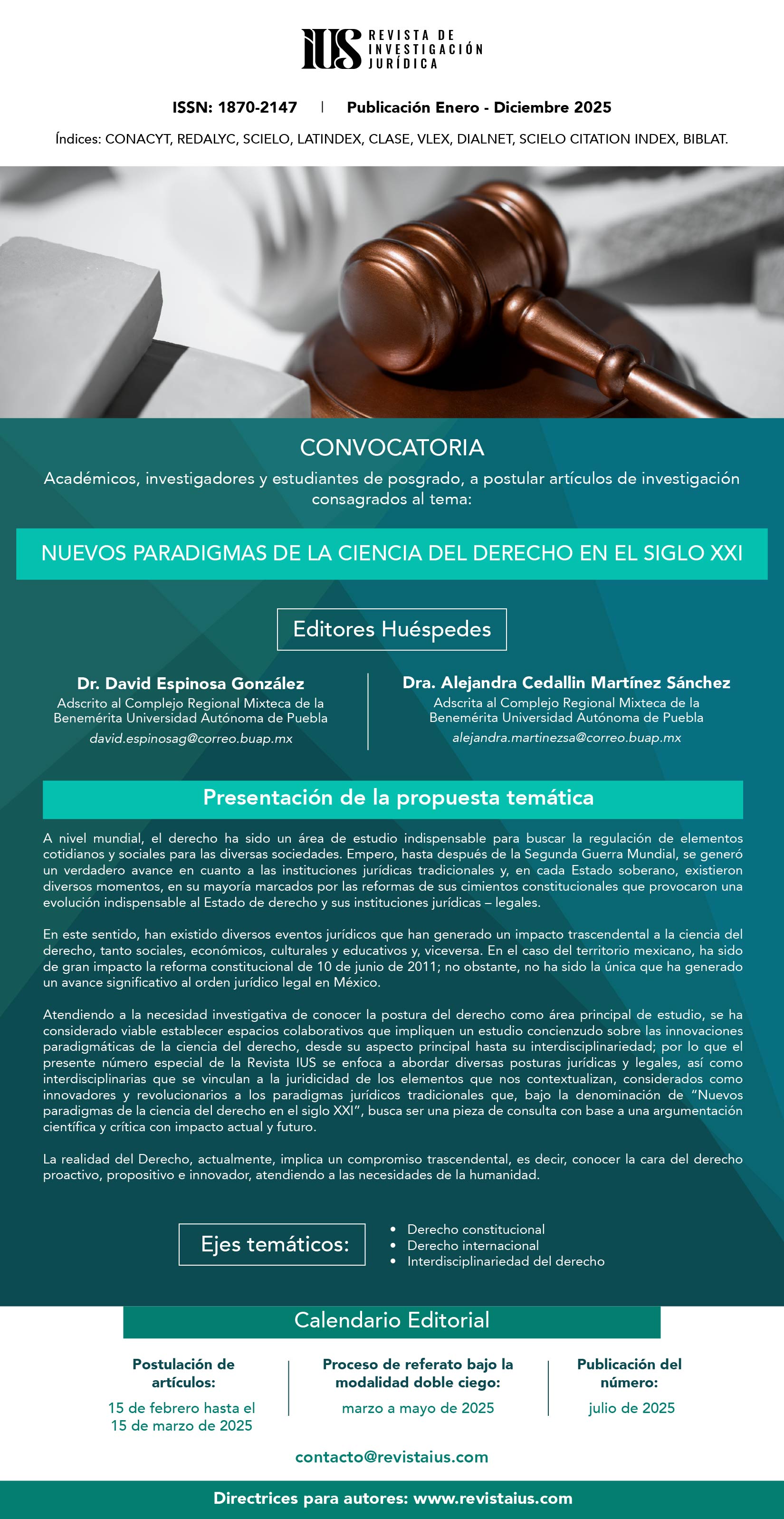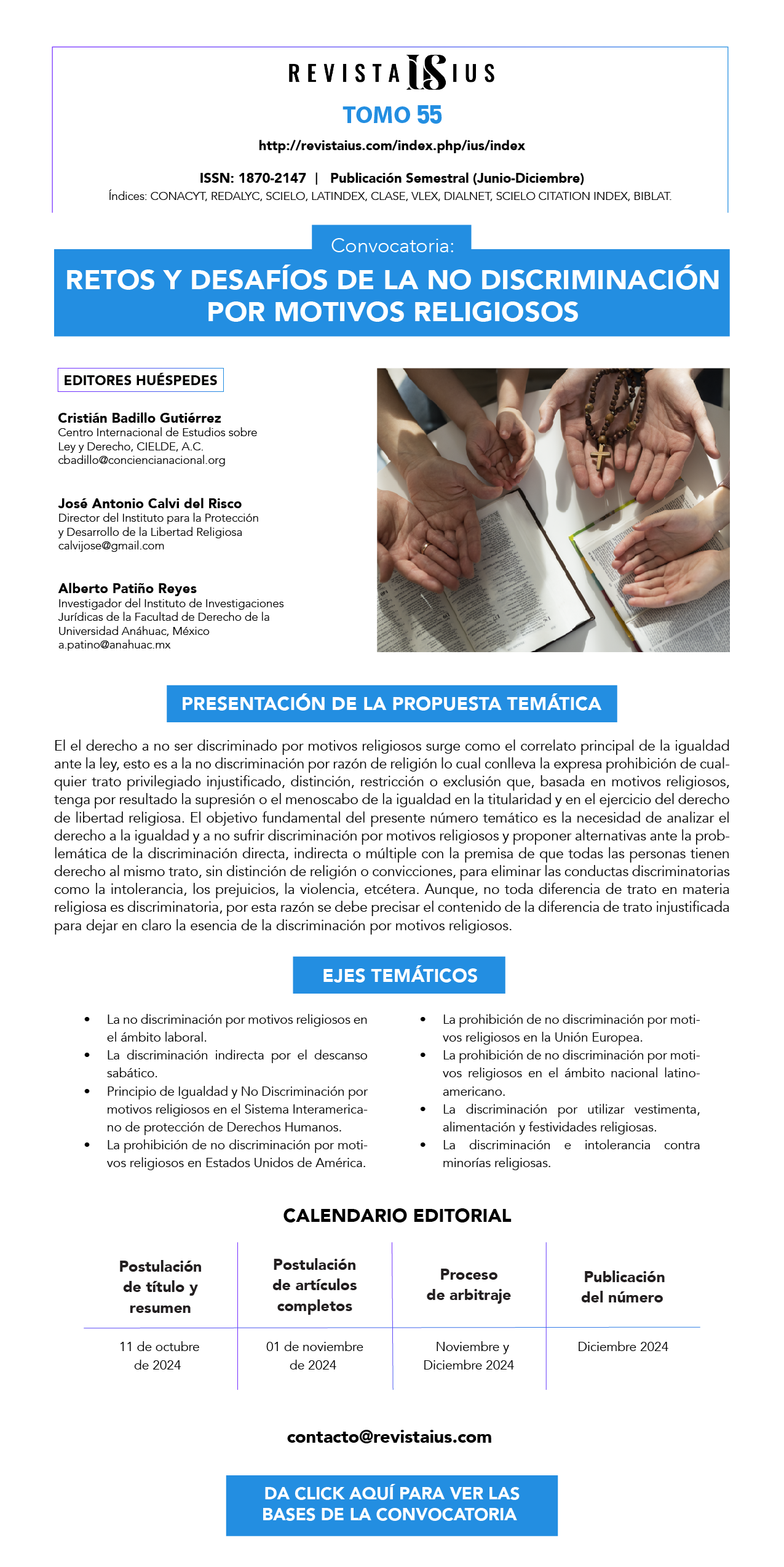Entre las restricciones y la creatividad: migrantes y derechos humanos en Sudáfrica y Tanzania
DOI:
https://doi.org/10.35487/rius.v11i40.2017.336Palabras clave:
Agencia, empoderamiento, derechos humanos, migrantes, Sudáfrica, Tanzania.Resumen
En años recientes, los movimientos migratorios se han consolidado como una preocupación fundamental en el mundo. El discurso oficial de muchos países subraya el valor de las migraciones, pero con frecuencia la presencia de migrantes genera distintas formas de rechazo e intentos por limitar sus derechos. Los migrantes han tenido que desarrollar diversas estrategias para enfrentar las restricciones y responder a las violaciones a sus derechos. El presente artículo explora la forma en que estas tendencias se han manifestado en el caso específico de dos países africanos: Sudáfrica y Tanzania. Además, ofrece un análisis comparativo de las experiencias comunes de los migrantes en relación con los derechos humanos y cómo se adaptan a los cambiantes contextos socioeconómicos y políticos en Sudáfrica y Tanzania.Descargas
Citas
Amisi, Baruti y Ballard, Richard, “In the Absence of Citizenship: Congolese refugee struggle and organization in South Africa. A case of study for ukzn project entitled: Globalisation, Marginalisation and New Social Movements in post-Apartheid South Africa”, Durban, University of Kwazulu-Natal, 2005, pp. 3-6. [Consulta: 8 de octubre, 2016]. Disponible en: http://ccs.ukzn.ac.za/files/Amisi%20Ballard%20Refugees%20Research%20Report.pdf
Asylum Access Tanzania, No place called home. A report on urban refugees living in Dar es Salaam, Dar es Salaam, Asylum Access Tanzania, p. 7. Disponible en: http://asylumaccess.org/wp-content/uploads/2014/08/No-Place-Called-Home.pdf
Bakewell, Oliver, “Some Reflections on Structure and Agency in Migration Theory”, Journal of Ethnic and Migration Studies, vol. 36, núm. 10, 2010.
Cea D’Ancona, María Ángeles, “La exteriorización de la Xenofobia”, Revista Española de Investigaciones Sociológicas, núm. 112, octubre-diciembre, 2005.
Charman, Andrew y Peterson, Leif, “A Transnational Space of Business: The Informal Economy of Ivory Park, Johannesburg”, en Jonathan Crush, y Abel Chikanda (eds.), Mean Streets: migration, xenophobia and informality in South Africa, Ciudad del Cabo, Southern African Migration Programme - the African Centre for Cities - The International Development Research Centre, 2015.
Chaulia, Sreeram Sundar, “The Politics of Refugee Hosting in Tanzania: from Open Door to Unsustainability, Insecurity and Receding Receptivity”, Journal of Refugee Studies, vol. 16, núm. 2, 2003.
Ching’ole, Andrew Stanley, “Refugee and Development in Tanzania: An Exploration of benefits of Refugee Presence on Local Communities A case of North Western Tanzania”, Developing Country Studies, vol. 5, núm. 12, 2015.
csfm-irri, “I don’t know where to go”, Burundian Refugees in Tanzania under Pressure to Leave, Dar es Salaam, Centre for the Study of Forced Migration-International Refugee Rights Initiative, 2009.
Crush, Jonathan, “South Africa: Policy in the Face of the Xenophobia”, Migration Policy Institute. [Consulta: 15 de octubre, 2016]. Disponible en: http://www.migrationpolicy.org/article/south-africa-policy-face-xenophobia
Crush, Jonathan, et al., “Migrant Entrepreneur and informality in South Africa”, en Jonathan Crush y Abel Chikanda (eds.), Mean Streets: migration, xenophobia and informality in South Africa, Ciudad del Cabo, Southern African Migration Programme - African Centre for Cities - The International Development Research Centre, 2015.
Crush, Jonathan y Ramachandran, Sujata, “Chapter two. Doing Bussiness with Xenophobia”, en Jonathan Crush, y Abel Chikanda (eds.), Mean Streets: migration, xenophobia and informality in South Africa, Ciudad del Cabo, Southern African Migration Programme - the African Centre for Cities - The International Development Research Centre, 2015.
Crush, Jonathan y Tawodzera, Godfrey, “Medical Xenophobia and Zimbabwean Migrant Access to Public Health Services in South Africa”, Journal of Ethnic and Migration Studies, vol. 40, núm. 4, 2014, pp. 655-
[Consulta: 15 de noviembre, 2016]. Disponible en: http://dx.doi.
org/10.1080/1369183X.2013.830504
Enwere, Corlivics Onuoha, Human rights and refugee protection in South Africa (1994-2004), Thesis, University of the Witwatersrand, 2006.
Epstein, Gil y Gang, Iran, “Migration and Culture”, iza dp, núm. 5123, 2010, p. 3. [Consulta: 9 de octubre, 2016]. Disponible en: http://ftp.iza.org/dp5123.pdf
“Exploring Tsonga Underground Money Transfer System-SA to Moz”, Vivmag. [Consulta: 10 de octubre, 2016]. Disponible en: http://www.vivmag.co.za/archives/10297
Fourchard, Laurent y Segatti, Aurelia, “Introduction of Xenophobia and Citizenship: the everyday politics of exclusion and inclusion in Africa”, Africa, vol. 85, núm. 1, 2015.
Gumbo, Trynos, “Resilience and Innovation: Migrant Spaza Shops Entrepreneurs in Soweto, Johannesburg”, en Jonathan Crush y Abel Chikanda (eds.), Mean Streets: migration, xenophobia and informality in South Africa, Ciudad del Cabo, Southern African Migration Programme - African Centre for Cities - The International Development Research Centre, 2015.
Hlatshwayo, Mondli, “Xenophobia, Resilience, and Resistance of Immigrants Workers in South Africa: Collective and Individual Responses”, en Aziz Choudry y Mondi Hlatswayo (eds.), Just Work? Migrant Workers’s Struggles Today, Londres, Pluto Press, 2016.
IRIN, “icva warns against refugee repatriation from Tanzania”, 2002. Disponible en:http://www.irinnews.org/ar/node/199821
Jara, Mazibuko y Peberdy, Sally, “Progressive Humanitarian and Social Mobilisation in a Neo-Apartheid Cape Town: A Report on Civil Society and the May 2008
Xenophobic violence. Research Report”, The Atlantic Philanthopies, pp. 35-37. [Consulta: 7 de octubre, 2016]. Disponible en: http://www.atlanticphilanthropies.org/app/uploads/2010/07/2_Cape_town_c.pdf
Kongeter, Stefan y Smith, Wendy, “Transnational Agency. Migrants, Movements and Social Support Crossing Borders”, en Stefan Kongeter, y Wendy Smith (eds.),Transnational Agency and Migration: Actors, Movements, and Social Support, Nueva York, Taylor and Francis, 2015.
Landau, Loren, “Beyond the Losers: Transforming Governmental Practices in Refugee Affected Tanzania”, Journal of Refugee Studies, vol. 16, núm. 1, 2003.
Legassick, Martin, “Gold, Agriculture and Secondary Industry in South Africa”, en Palmer y Parson (ed.), The roots of rural poverty in Central and Southern Africa, University of California Press, 1977.
Malkki, Liisa, “Speechless Emissaries: Refugees, Humanitarianism, and Dehistoricization”, Cultural Anthropology, vol. 11, núm. 3, 1996.
Mann, Gillian, “‘Finding a Life Among Undocumented Congolese Refugee Children in Tanzania”, Children & Society, vol. 24, 2010.
Mann, Gillian, “Beyond war: ‘suffering’ among displaced Congolese children in Dar es Salaam”, Development in Practice, vol. 22, núm. 4, 2012.
Murray, Martin, “Alien Strangers in Our Midst: The Dreaded Foreign Invasion and Fortress South Africa”, Canadian Journal of African Studies, vol. 37, núm. 2-3, 2003.
Mataure, Mandla, “Citizens Perception on Migration in South Africa”, Afrobarometer Briefing Paper, núm. 112. [Consulta: 5 de febrero, 2017]. Disponible en: http://afrobarometer.org/sites/default/files/publications/Briefing%20
paper/afrobriefno112_2.pdf
ONU - ohchr, Migration and human rights. Improving Human Rights-Based Governance of International Migration. Ginebra, onu - ohchr, 2013, pp. 7-8. Disponible en: http://www.ohchr.org/Documents/Issues/Migration/Migration-
HR_improvingHR_Report.pdf
“R60m drug bust in Pretoria”, Sowetan Live, 13 de septiembre, 2012. [Consulta: 9 de octubre, 2016]. Disponible en: http://www.sowetanlive.co.za/ news/2012/09/13/r60m-drug-bust-in-pretoria?filter=all_comments
Riger, Stephanie, “What’s wrong with empowerment”, American Journal of Community Psicology, junio de 1993.
Sadouni, Samadia, “The stratified diasporas of Somalians”, Mail & Guardian, 13 de febrero, 2015. [Consulta: 9 de octubre, 2016]. Disponible en: http://mg.co.za/article/2015-02-13-the-stratified-diasporas-of-somalians/
Samman, Emma y Santos, Maria Emma, Agency and Empowerment: A review of concepts, indicators and empirical evidence, Oxford, University of Oxford, 2009.
Solomon, Hussein, Of Myths and Migration. Illegal immigration into South Africa, Pretoria, unisa, 2003.
Sulaiman, Philip, “From Mogadishu to Mayfair: Somali diaspora finds home in Johannesburg”, Brand South Africa, 2016. [Consulta: 9 de octubre, 2016]. Disponible en http://www.mediaclubsouthafrica.com/africa/4459-from-mogadishu-
to-mayfair-somali-diaspora-finds-home-in-johannesburg
“Tanzania: People cope with these tough living conditions because often they haven’t known anything else”, Médicos sin Fronteras, 9 de diciembre, 2015. [Consulta: 5 de febrero, 2017]. Disponible en: http://www.msf.org/en/article/tanzania-%E2%80%9Cpeople-cope-these-tough-living-conditions-because-often-they-haven%E2%80%99t-known
Thomson, Marnie Jane, “Mud, Dust, and Marougé: Precarious Construction in a Congolese
Refugee Camp”, Architectural Theory Review, vol. 19, núm. 13, 2014.
Turner, Simon, “Under the Gaze of the 'Big Nations': Refugees, Rumours and the International Community in Tanzania”, African Affairs, núm. 103, 2004.
Van Hoyweghen, Saskia, Mobility, territoriality and sovereignty in post-colonial Tanzania, acnur, octubre de 2001. Disponible en: http://www.unhcr.org/research/working/3bf101b37/mobility-territoriality-sovereignty-post-colonial-tanzania-saskia-van-hoyweghen.html
Vigaud Walsh, Francisca, “Women and girls failed: The burundian refugee response in Tanzania”, Refugees International, 22 de diciembre, 2015. [Consulta:5 de febrero, 2017]. Disponible en: https://static1.squarespace.com/static/506c8ea1e4b01d9450dd53f5/t/5678aee07086d7cddecf1bab/1450749707001/20151222+Tanzania.pdf
Wa Kwabe, Aurelia, “Reforming South African immigration policy in the post-apartheid period (1990-2006): what it means and what it takes”, Wa Kwabe Segatti y Landau (eds.), Migration in post-apartheid South Africa: Challenges and questions to policy-makers, Research Department Agence Francaise de Developpement, 2008, p. 61. [Consulta: 27 de octubre, 2016]. Disponible en: http://www.afd.fr/jahia/webdav/site/afd/shared/PUBLICATIONS/RECHERCHE/Archives/Notes-et-documents/38-notes-documents-VA.pdf
Wentzel, Marie y Tlabela, Kholadi, Migration in South and Southern Africa. Dynamics and determinants, hsrc Press. [Consulta: 27 de octubre, 2016]. Disponible en: http://www.hsrcpress.ac.za/product.php?productid=2094&freedownload=1
West, Amy y Wambugu, W. Lydia, Left to their own Devices. The Impact of Informal Information and Communication Networks on Security in the Tanzanian Refugee Camps, Londres, Article 19, 2003.
Willems, Roos, “Coping with Displacement: Social Networking among Urban Refugees in an East African Context”, en Itaru Ohta y Gebre Yntiso (eds.), Displacement Risks in Africa: Refugees, Resettlers and their Host Populations, Australia, Trans Pacific Press, 2005.
Women’s Refugee Commission, The Path to Hope. Congolese Refugee Adolescent Girls in Nyarugusu Refugee Camp, Tanzania, Nueva York, Women’s Refugee Commission, 2012. Disponible en: https://www.womensrefugeecommission.org/resources/document/868-the-path-to-hope-congolese-refugee-adolescent-girls-in-nyarugusu-refugee-camp-tanzania
“Why the Deadly Attacks Against Foreigners In South Africa Come As No Surprise”, The Huffington Post, 26 de abril, 2015. [Consulta: 5 de febrero, 2017). Disponible en: http://www.huffingtonpost.com/2015/04/26/south-africa-xenophobic-attacks_n_7119816.html
Zack, Tanya, “Making an Area Hot: Interrumpting Trade in an Ethnic Enclave in Johannesburg’s Inner City”, en Jonathan Crush y Abel Chikanda (eds.), Mean Streets: migration, xenophobia and informality in South Africa, Ciudad del Cabo, Southern African Migration Programme - African Centre for Cities -The International Development Research Centre, 2015.
Zondi, Siphamandla, “Xenophobic Attacks. Towards and Understanding of
Violenceagainst African Immigrants in South Africa”, Africa Insight, vol. 38, núm.2, 2008.
Publicado
Número
Sección
Licencia
Revista IUS por el Centro Internacional de Estudios sobre Ley y Derecho. se distribuye bajo una Licencia Creative Commons Atribución-NoComercial-CompartirIgual 4.0 Internacional.
Autorizamos a sus colaboradores a que suban una copia de sus trabajos publicados en sus webs personales o en cualquier repositorio de acceso abierto, siempre y cuando se mencione específicamente a la Revista IUS como fuente original de procedencia, citando el año y número del ejemplar respectivo y añadiendo el enlace a la página web donde este órgano editorial puede ser consultado in toto, de manera abierta y gratuita en: http://www.revistaius.com
Las y los lectores tienen libertad para:
Compartir, copiar y redistribuir el material en cualquier medio o formato.
El licenciante no puede revocar estas libertades en tanto usted siga los términos de la licencia.
De acuerdo con los siguientes términos:
Atribución: El lector debe reconocer el crédito de una obra de manera adecuada, proporcionar un enlace a la licencia, e indicar si se han realizado cambios. Puede hacerlo en cualquier forma razonable, pero no de forma tal que sugiera que tiene el apoyo del licenciante o lo recibe por el uso que hace.
No comercial: El lector no puede hacer uso del material con fines comerciales.
Si remezcla, transforma o crea a partir del material, deberá difundir sus contribuciones bajo la misma licencia que el original.
Cargos por gestión de artículos
Revista IUS no cobra tarifas por recibir, procesar o publicar los artículos (Article Processing Charge [APC]) enviados por los autores.





